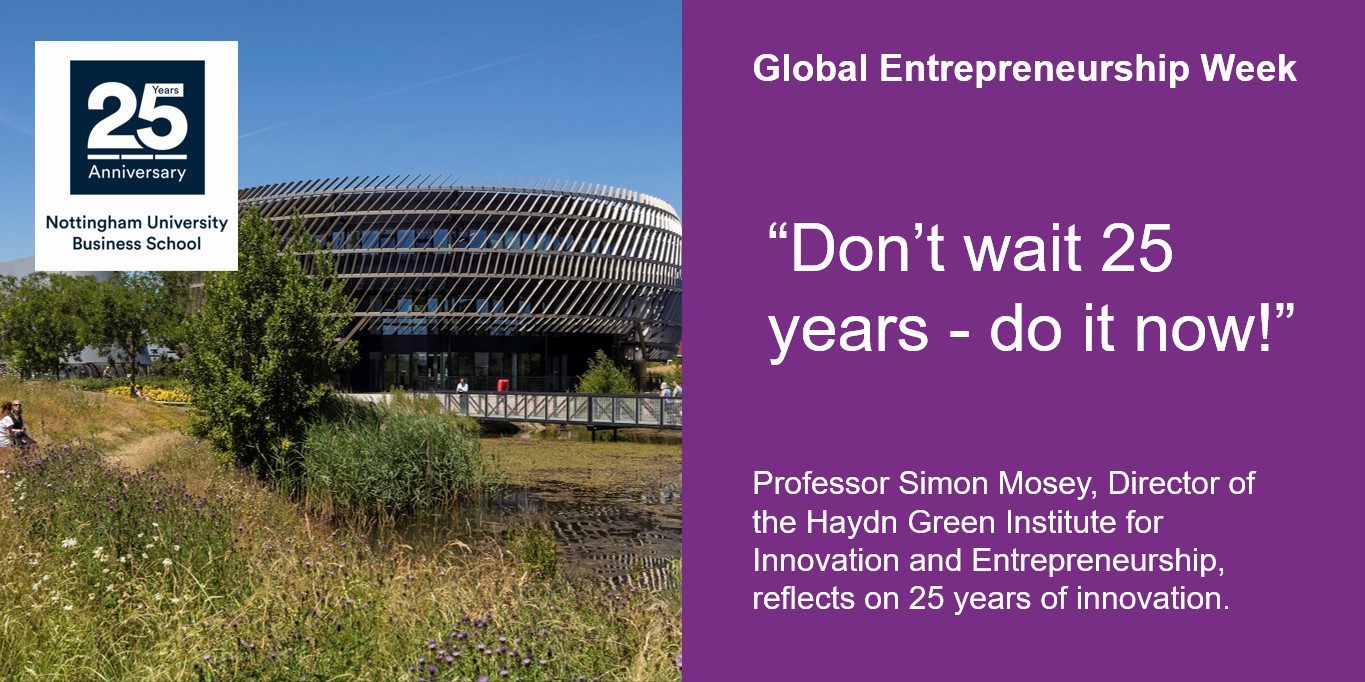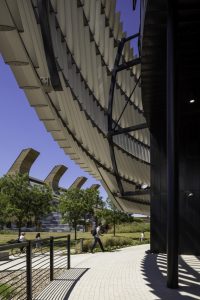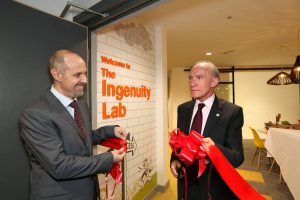
November 15, 2023, by aczht
Global Entrepreneurship Week 2023 – 25 years of innovation by Professor Simon Mosey
We continue to celebrate Global Entrepreneurship Week 2023 with a reflective blog by Professor Simon Mosey, Director of the Haydn Green Institute for Innovation and Entrepreneurship. Simon’s inspiring journey started in the Nottingham University Business School 25 years ago with his progressive research, pioneering approach and relentless optimism which has been key to supporting many entrepreneurs build such thriving businesses. His blog is a fascinating journey over 25 years and how we can all embrace change and be innovators – it’s never too late.
We are all innovators now: My reflections on 25 years at Nottingham University Business School
Professor Simon Mosey, Director of the Haydn Green Institute for Innovation and Entrepreneurship
“Looking back to 26 years ago, I was working at Courtaulds corporate research doing what most people think of as innovation. In my white lab coat, I was formulating and testing more sustainable paint materials. Yes, I was being paid to watch paint dry! That year, Courtaulds was acquired by Akzo Nobel, and I was encouraged to apply for a research fellowship at the University of Nottingham. I was excited to be offered the job and joined the Engineering Faculty in the department of operations management. I had a fascinating time, working with small businesses based in Nottingham, Denmark and the former East Germany. I didn’t realise it at the time, but I was embarking upon a lifetime’s fascination with the world of innovation.
“One of my first tasks was to hold an innovation workshop with small business owners across Nottinghamshire. They were struggling to cope with the demise of the coal and textile industries and could not yet make sense of the profound impact that the internet would go on to make. (My colleagues made me feel really old recently by pointing out that I joined the university one week before Google was invented).
“By contrast, at workshops in Denmark I saw small businesses facing the challenge of moving away from an agricultural economy towards a knowledge-based form of competition. While in Germany we had fascinating discussions with businesses that were transitioning from having a monopoly over sales to the former Soviet Union to having to find market opportunities globally and to compete for the first time. I captured this diversity of experiences within my PhD and began to build a more nuanced view of how small business leaders can cope with disruptive change.
“As I was writing up my PhD a new Institute was created in the fledgling Business School by Professor Martin Binks. The Institute for Enterprise and Innovation’s aim was to provide entrepreneurial skills for scientists and engineers and create the innovators of the future. I attended one of the Institute’s first modules and was inspired by Martin’s vision. I thought ‘this is what I want to do’ and I was fortunate enough to gain a lectureship with the Institute in 2001. It was an unexpected bonus when my colleagues from operations management moved over en-masse a few years later.
“Work at the Institute was pathbreaking as we created the first Masters in Entrepreneurship Science and Technology in the UK, and the Enterprise lab was opened to provide free support and advice for students to build new ventures. I was in the fortunate position of being asked to create a new module based on my PhD and Innovation Management was offered to MSc students initially and then expanded into the undergraduate and MBA curriculum.

Ingenuity Centre – Jubilee campus
“When I first began teaching Innovation Management, I asked the students ‘what innovation are you most looking forward to?’ The most common answer was ‘a flying car’ as people were frustrated with the Nottingham traffic. I then asked which company would be most likely to build this flying car and the typical response was Nokia as they were seen as the most innovative company in the world at that time. Twenty-five years later and students are still stuck in traffic, waiting for that flying car and what has happened to Nokia?
“The change no one saw coming was the smartphone, now just called a phone, which virtually destroyed Nokia. This unleashed a wave of innovation that offers us hope that traffic queues may be a thing of the past, as we increasingly engage in working, shopping and learning online, reducing the need for the dreaded commute, where everyone has to travel at the same time each day. However, the commute is still there in many parts of the world and other problems seem to be getting worse so how do we make sense of these seemingly intractable changes?
“When I was working with small businesses 25 years ago their world view was similarly volatile and overwhelming. Yet they managed to innovate and many of them are still trading in completely different markets and using completely different technologies. How did they do this? To summarise an extremely complex topic, they kept an open mind in the face of uncertainty and were determined to try new approaches, even though they knew they probably wouldn’t work as envisaged. It has been my privilege to be part of a team that captured, codified and shared the successful innovation journeys of these businesses and thousands of others like them. We call this collective wisdom ‘the Ingenuity process’.
“We have seen that this ingenuity can be learnt and helping people to build such ingenuity has subsequently become the purpose of the Institute since it was renamed in 2011 – the Haydn Green Institute for Innovation and Entrepreneurship. Thanks to the generous donation of the Haydn Green family, we have been able to pioneer many new approaches to teaching and learning with individuals and organisations that wish to try different approaches to their innovation challenges.

Professor Simon Mosey with Professor Sir David Greenaway (former Vice-Chancellor of The University of Nottingham) at the opening of The Ingenuity Centre.
“This culminated in 2016 with the building of the Ingenuity Centre. Here we realised a purpose-built facility for students and alumni to build businesses to address the challenges the world faces. Our Ingenuity lab has gone from strength to strength and in the last financial year a cumulative turnover of over £400 million was created by these talented individuals. We were able to create more inclusive online learning to reach out nationally and internationally through the Ingenuity programme and support innovators aiming to improve community prosperity, health and sustainability. We were proud to host the 25th anniversary of Your Entrepreneur Scheme where scientists and engineers from around the world shared their reflections on building global ventures to improve healthcare and agriculture. And we celebrated the 5th anniversary of the Witty entrepreneurial scholarships where the Witty family donated £1m to support student entrepreneurs from low-income backgrounds to explore more innovative career paths.
“So, what do I conclude after 25 years of working with people determined to change things for the better? First, I am really thankful for the amazing opportunities the university and all my amazing colleagues have shared with me over the last quarter century. Second, I remain optimistic despite the significant challenges facing us all, I would suggest that we are all innovators now. Wherever I travel, I meet people using digital tools to pursue their secret passions and increasingly these side hustles become amazing new ventures with lives of their own. If you want to get involved and turn your passion into a scalable innovation, then please come and join us. We have opportunities for you to join the conversation, become a mentor to our innovators and of course all the support you need if you wish to start up your own venture.”

No comments yet, fill out a comment to be the first

Leave a Reply